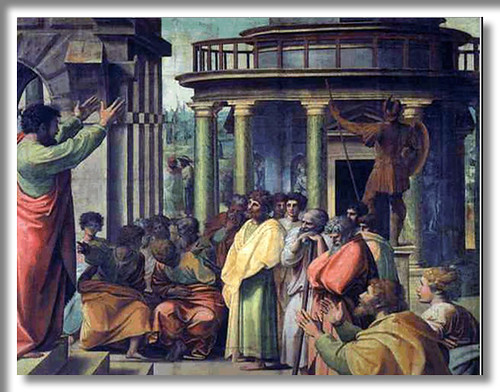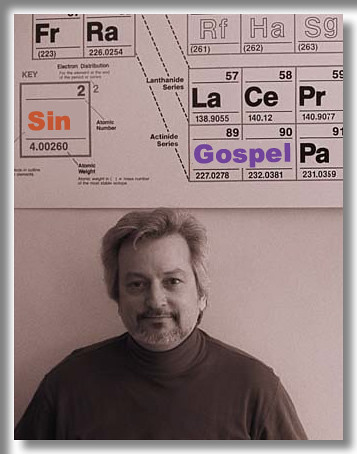
Last Lord’s day, our church began a comparative study of Paul‘s Gospel presentations in Acts chapters 13 and 17. Like all other Gospel presentations in the Bible, these two have their distinctions, while sharing the same important foundation of Christ and Him crucified. How the Apostle arrives at this centerpiece of the Gospel is quite different when we examine each presentation, side by side. It is important to note that Paul’s example of ministry is crucial:
– the message of Christ is sovereign in each case, however, the mode of presentation varied slightly according to the theological knowledge or ignorance of his audience.
For the brethren at Pilgrim Bible Church, their homework will be to answer the following questions:
1. Is Paul’s message in Acts 13 a thorough Gospel presentation?
2. Is his message in Acts 17 a thorough Gospel presentation?
3. How does Acts 17 differ from Acts 13?
This comparative study is important and will help us to think about witnessing to others in the present day. Again – the message of the Gospel is sovereign, but the way in which we unfold it will depend (somewhat) on the people to whom we speak. But at this point, we are just laying out the bare principle that distinguishes the substance of our message (Christ) and the means by which we communicate that message. As to this latter point, Acts 17 can be helpful to us in many ways, and yet it still presents a unique experience that we will rarely have here in American: meeting people who are totally ignorant about Jesus Christ.
You see, when Paul ascended the Areopagus, he had just left his preaching in the synagogue there in Athens, and was exhorted by a group of Epicurean and Stoic philosophers to speak more about the “strange deity” of whom Paul spoke (Acts 17:18). Their ignorance of the true God was confirmed when Paul said:
Acts 17:22-23: 22 …”Men of Athens, I observe that you are very religious in all respects. 23 “For while I was passing through and examining the objects of your worship, I also found an altar with this inscription, ‘TO AN UNKNOWN GOD.’ What therefore you worship in ignorance (agnoountes), this I proclaim to you.
The Athenians were truly ignorant of Christ in every way. They knew little to nothing about His first advent, nor of the O.T. covenants and promises which spoke of Him, or as Paul said to the church at Ephesus:
Ephesians 2:12: 12 remember that you (Gentiles in the flesh, v 11) were at that time separate from Christ, excluded from the commonwealth of Israel, and strangers to the covenants of promise, having no hope and without God in the world.
Paul was well aware of the Athenians’ lack of knowledge concerning the O.T. promises, as well as their infatuation with Graeco/Roman deities; and it is for this reason that he didn’t repeat his Acts 13 Gospel presentation to the Jews verbatim. As an inspired sermon, Acts 13 is in fact perfect; but to the Athenians, who were utterly devoid of any significant biblical knowledge, Paul gave a Gospel presentation that moved at a much slower pace. Yes, it was equally inspired by the Spirit of God, but it was presented in a manner that would be more understandable to his audience. In this sermon, Paul began with small steps which led him towards the message of Christ – which was interrupted as soon as he mentioned the resurrection (Acts 17:32). In this we see Paul’s patience in communicating the Gospel, doing so with a great deal of compassion for his audience: as a parent might speak to a little child with terms that are simplified (1 Corinthians 3:1), Paul chose to move with incremental steps on the way to the cross at Mars Hill. But as I mentioned already, Paul’s context of ministry at the Areopagus had a distinct advantage that we do not have:
At least his audience was in fact ignorant.
You see, in the case of those who are doctrinally ignorant, one can begin with a clean slate, seeing that there is very little doctrinal baggage to take down so as to make room for the Gospel itself. But in our day, evangelism requires much more epistemological demolition (2 Cor. 10:5), because most Americans have heard an ear-full concerning Jesus Christ – and precious little of it is of any value. Whether we are facing people who believe in the “Jesus” of modern liberalism, the secular media, the “Jesus” of the cults, or the “Jesus” of mindless fundamentalism – All of these will require some form of doctrinal demolition and redefinition as we proclaim the Gospel to others.
In other words, modern America worships at the altar of the “Unknown Jesus,” and we must be careful to proclaim Gospel truth so that the Savior doesn’t become yet another statue amidst a pantheon of American idols.
This can be much more complex than being invited to speak to a group of ignorant philosophers. But in a day of venomous attacks against Christ and His disciples, there is much suspicion and distrust in our culture. Even among professing Evangelicals, we have men, who in the name of Christ will slander certain Christians, calling them terrorists; rank behavior as this makes it even more challenging to witness to the vast sea of lost souls here in the religious south. It is for this reason that Gospel presentations may require more time in order to clarify and explain the very terms of the Gospel itself. Words like faith, justice, salvation, substitution, grace, mercy, condemnation, sin and damnation all have their alternate meanings amidst the aforementioned epistemologies, and thus it behooves the child of God to present the Gospel, while making sure that those who hear us are understanding that the biblical Gospel is not the same thing as the false imitation that they had been given before.
Ultimately, it is important that we communicate the Gospel, not just so that we can say that we did so. We must also endeavor to communicate to people so that they understand what is being said. In many ways, you  can just think about the process that is required to explain the Gospel to a four year old child. Give them a heavy theological presentation, filled with complex terms, biblical texts and an amen at the end, and they’ll be giving you that cross-eyed look very soon. But this is not what a caring and compassionate parent does. He breaks the message down into very simple terms and is careful to make sure that the child is comprehending what is being said – because children are ignorant too, in view of their youth and therefore must receive a Gospel pedagogy that is patient, persistent and committed to the message of Christ, His crucifixion and resurrection. Of course, I’m not suggesting that we treat unbelieving adults like children per se, but the principles of patience and compassion still do apply. Unlike the ancient Athenians in Paul’s day, the modern American has heard a truck load about Jesus Christ. Our challenge is to navigate our way through their false perceptions, while faithfully and patiently communicating the uncompromising Gospel of Jesus Christ.
can just think about the process that is required to explain the Gospel to a four year old child. Give them a heavy theological presentation, filled with complex terms, biblical texts and an amen at the end, and they’ll be giving you that cross-eyed look very soon. But this is not what a caring and compassionate parent does. He breaks the message down into very simple terms and is careful to make sure that the child is comprehending what is being said – because children are ignorant too, in view of their youth and therefore must receive a Gospel pedagogy that is patient, persistent and committed to the message of Christ, His crucifixion and resurrection. Of course, I’m not suggesting that we treat unbelieving adults like children per se, but the principles of patience and compassion still do apply. Unlike the ancient Athenians in Paul’s day, the modern American has heard a truck load about Jesus Christ. Our challenge is to navigate our way through their false perceptions, while faithfully and patiently communicating the uncompromising Gospel of Jesus Christ.
